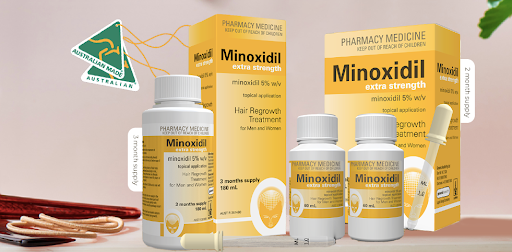Understanding Hair Loss
Hair loss, also known as alopecia, can stem from a variety of causes, including genetics, hormonal changes, medical conditions, and lifestyle factors. Androgenetic alopecia, or male pattern baldness, is the most common form, marked by a receding hairline and thinning crown. Stress, nutritional deficiencies, and environmental factors can also contribute to hair shedding. Understanding the underlying cause is crucial for selecting the most effective treatment strategy.
Popular Over-the-Counter Solutions
Over-the-counter (OTC) solutions for hair loss are widely accessible and include topical treatments like minoxidil (Rogaine). Minoxidil is an FDA-approved solution that stimulates hair follicles and promotes regrowth by shortening the telogen (resting) phase of hair growth. Available in liquid or foam form, it needs to be applied directly to the scalp. OTC shampoos and conditioners containing ingredients such as ketoconazole also help by reducing scalp inflammation and treating conditions like dandruff, which can exacerbate hair loss.
Prescription Medications
Prescription medications are often used when over-the-counter solutions prove insufficient. Finasteride (Propecia) is one of the most commonly prescribed drugs for androgenetic alopecia. It works by inhibiting the enzyme 5-alpha-reductase, which converts testosterone to dihydrotestosterone (DHT), a hormone linked to hair loss. Another prescription option is dutasteride (Avodart), which is typically more robust and is used for more severe cases. It’s essential to consult a healthcare provider to understand the potential side effects and ascertain the correct dosage.
Natural Remedies and Lifestyle Changes
Natural remedies and lifestyle changes can be effective alternatives to traditional medications for managing various health conditions. They are often accessible, affordable, and have fewer side effects. Here are some common natural remedies that can help improve your overall well-being:
-
Herbal supplements: Herbal supplements are made from plants and are believed to have medicinal properties. Some popular herbal remedies include ginseng, echinacea, garlic, turmeric, and ginger. These herbs have been used for centuries in traditional medicine and may help with a variety of ailments, such as inflammation, pain relief, and immune support.
-
Essential oils: Essential oils are concentrated extracts from plants that contain their aromatic compounds. They can be used topically or inhaled through a diffuser to promote relaxation, improve mood, and relieve symptoms of various conditions. Some common essential oils include lavender, peppermint, tea tree, and eucalyptus.
-
Acupuncture: Acupuncture is an ancient Chinese therapy that involves inserting thin needles into specific points on the body to stimulate the flow of energy or “qi.” This practice is believed to help with pain management, stress relief, and improving overall health.
-
Meditation: Meditation is a mindfulness practice that involves training your mind to focus on the present moment. It has been shown to reduce stress and anxiety, improve sleep quality, and enhance overall well-being.
-
Yoga: Yoga combines physical postures (asanas) with breath control and meditation for a holistic approach to health and wellness. It can help improve flexibility, strength, and balance, as well as reduce stress and promote relaxation.
-
Dietary changes: What you eat can have a significant impact on your health. Incorporating more fruits, vegetables, and whole foods into your diet can provide essential vitamins, minerals, and antioxidants that support a healthy immune system. Additionally, reducing processed foods and sugar intake may also improve overall health.
Understanding Hair Loss
Causes of Hair Loss
First, it is essential to understand the causes of hair loss. Many different factors can contribute to hair loss, including genetics, hormonal imbalances, medical conditions, and lifestyle choices.
Genetics
One of the most common causes of hair loss is genetics. This type of hair loss is known as male or female pattern baldness and is hereditary. It typically starts with a receding hairline in men and thinning at the crown in both men and women. Genetics play a significant role in determining when this type of hair loss will occur and how severe it will be.
Hormonal Imbalances
Hormonal imbalances can also lead to hair loss. This can occur due to changes in hormone levels, such as during pregnancy, menopause, or thyroid disorders. These imbalances can affect the hair growth cycle and lead to excessive shedding or thinning.
Medical Conditions
Certain medical conditions can also cause hair loss. Autoimmune diseases like alopecia areata attack the hair follicles, resulting in patchy hair loss. Scalp infections and skin disorders can also impact hair growth. In addition, some medications used to treat illnesses may have side effects that include hair loss.
Lifestyle Choices
Lastly, lifestyle choices can contribute to hair loss. Poor nutrition, smoking, and excessive stress can all impact the health of your hair. A lack of essential vitamins and minerals in your diet can result in weakened and thinning hair. Smoking can restrict blood flow to the scalp, while chronic stress can interrupt the hair growth cycle.
Preventing Hair Loss
While many causes of hair loss cannot be controlled, you can take steps to prevent it from occurring or worsening.
Follow a Healthy Diet
Eating a well-balanced diet rich in vitamins and minerals is essential for maintaining healthy hair. Make sure to include foods like leafy greens, eggs, fish, and nuts, which are all good sources of nutrients that are essential for hair health.
Reduce Stress
Finding ways to manage stress levels is crucial for preventing hair loss. Engaging in activities like yoga, meditation, or exercise can help reduce stress and promote healthy hair growth.
Avoid Damaging Hair Treatments
Chemical treatments like bleaching, perming, and straightening can damage hair over time. Limiting or avoiding these treatments can help prevent hair loss and maintain hair health.
Seek Treatment for Medical Conditions
If you are experiencing hair loss due to a medical condition, seeking treatment for the underlying issue can help improve the health of your hair. Consulting with a healthcare professional is recommended for proper diagnosis and treatment.
Hair Loss Treatments
While preventing hair loss is essential, it’s also crucial to address any existing issues or concerns with appropriate treatment methods.
Here are some common treatments for hair loss:
-
Medications: There are medications available that can help slow down or prevent further hair loss. These include finasteride and minoxidil.
-
Hair Transplant Surgery: This involves taking healthy hair follicles from one area of the scalp and transplanting them into areas with thinning or balding hair.
-
Topical Treatments: Some topical treatments, such as corticosteroids or anti-inflammatory creams, can treat certain types of hair loss, such as alopecia areata.
It’s essential to consult with a healthcare professional before starting any type of hair loss treatment for men in Australia. They can help determine the best course of action based on your circumstances.
Low-Level Laser Therapy
Low-level laser Therapy (LLLT) is an emerging noninvasive treatment that uses laser light to stimulate hair follicles and promote growth. Devices like laser combs, helmets, and caps emit light that penetrates the scalp, increasing blood circulation and cellular activity. Studies suggest that consistent use of LLLT can improve hair density and strength. This method is painless and has no known severe side effects, although results may vary. Regular use is necessary for maintaining its benefits.
Scalp Micropigmentation
Scalp Micropigmentation (SMP) is a cosmetic procedure that involves tattooing tiny dots on the scalp to mimic the appearance of hair follicles. While it doesn’t promote hair growth, it creates the illusion of a fuller head of hair or a closely shaved scalp. SMP is particularly beneficial for those who want a low-maintenance solution to cover bald spots or thinning areas. The results are immediate and long-lasting, offering a viable alternative for men who prefer not to undergo surgery or take medications.
Choosing the Right Treatment for You
Choosing the proper hair loss treatment depends on various factors, including the cause and extent of hair loss, lifestyle, budget, and personal preferences. It is advisable to consult a healthcare professional or dermatologist to diagnose the specific type of hair loss and receive tailored advice. Combining multiple treatments may yield the best results for some individuals.
Assessing the pros and cons of each method, along with understanding possible side effects and long-term commitments, will help in making an informed decision. The journey toward treating hair loss is unique for everyone, so patience and perseverance are key. Remember, there is no one-size-fits-all solution, and the best treatment for you may require a combination of approaches. With the correct information and guidance, it’s possible to find an effective hair loss treatment that can help you look and feel your best.





